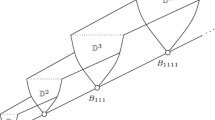Abstract
In this paper we study an alternative approach to the concept of abstract logic and to connectives in abstract logics. The notion of abstract logic was introduced by Brown and Suszko (Diss Math 102:9–42, 1973)—nevertheless, similar concepts have been investigated by various authors. Considering abstract logics as intersection structures we extend several notions to their κ-versions (κ ≥ ω), introduce a hierarchy of κ-prime theories, which is important for our treatment of infinite connectives, and study different concepts of κ-compactness. We are particularly interested in non-topped intersection structures viewed as semi-lattices with a minimal meet-dense subset, i.e., with a minimal generator set. We study a chain condition which is sufficient for a minimal generator set, implies compactness of the logic, and in regular logics is equivalent to (κ-) compactness of the consequence relation together with the existence of a (κ-)inconsistent set, where κ is the cofinality of the cardinality of the logic. Some of these results are known in a similar form in the context of closure spaces, we give extensions to (non-topped) intersection structures and to big cardinals presenting new proofs based on set-theoretical tools. The existence of a minimal generator set is crucial for our way to define connectives. Although our method can be extended to further non-classical connectives we concentrate here on intuitionistic and infinite ones. Our approach leads us to the concept of the set of complete theories which is stable under all considered connectives and gives rise to the definition of the topological space of the logic. Topological representations of (non-classical) abstract logics by means of this space remain to be further investigated.
Similar content being viewed by others
References
Abramsky S., Jung A. Domain theory. In: Abramsky S., Gabbay D.M., Maibaum T.S.E. (eds). Handbook for Logic and Computer Science, vol. 3. Clarendon Press, Oxford (1994)
Bloom S.L., Brown D.J. Classical abstract logics. Diss. Math. 102: 43–51 (1973)
Brown D.J., Suszko R. Abstract logics. Diss. Math. 102: 9–42 (1973)
Brunner, A.B.M., Lewitzka, S.: Representations of some Abstract Logics via Spectral Spaces, preprint (2007)
Cleave J.P. A Study of Logics. Oxford University Press, Oxford (1991)
Cohn P.M. Universal Algebra. Harper and Row, New York (1965)
Czelakowski J. The Suszko operator, Part I. Studia Logica (Special Issue on Algebraic Logic II) 74: 181–231 (2003)
Davey B.A., Priestley H.A. Introduction to Lattices and Order, 2nd edn. Cambridge University Press, Cambridge (2002)
Dunn J.M., Hardegree G.H. Algebraic Methods in Philosophical Logic. Clarendon Press, Oxford (2001)
Font, J.M., Jansana, R.: A General Algebraic Semantics for Sentential Logics. Lecture Notes in Logic, vol. 7. Springer, Berlin (1996)
Font J.M., Jansana R., Pigozzi D. A survey of abstract algebraic logic. Studia Logica (Special Issue on Algebraic Logic II) 74: 13–97 (2003)
Font J.M., Verdú V. A first approach to abstract modal logics. J. Symb. Logic 54: 1042–1062 (1989)
Isbell J.R. Directed union and chains. Proc. AMS 17: 1467–1468 (1966)
Jansana R., Palmigiano A. Referential semantics: duality and applications. Rep. Math. Log. 41: 63–93 (2006)
Lewitzka, S.: Abstract logics, logic maps and logic homomorphisms. In: Logica Universalis, vol. 1(2), pp. 243–276. Birkhäuser Verlag, Basel (2007)
Lewitzka, S.: ∈4: A 4-valued Truth Theory and Metalogic, preprint (2007)
Martin N.M., Pollard S. Closure Spaces and Logic. Kluwer, Dordrecht (1996)
van Fraassen B.C. Formal Semantics and Logic. Macmillan, New York (1971)
Author information
Authors and Affiliations
Corresponding author
Additional information
This research was developed during a visit of the first author at the Federal University of Bahia from March 2006 to September 2008 with support of grant CNPq/FAPESB 350092/2006-0. We wish to thank our colleagues Peter Malcolm Johnson and Samuel Gomes da Silva for helpful remarks and criticisms made during our logic seminar held at the Federal University of Bahia. Especially we would like to thank Bas C. van Fraassen who sent us two copies of his book Formal semantics and logic [18] which unfortunately is out of print.
Rights and permissions
About this article
Cite this article
Lewitzka, S., Brunner, A.B.M. Minimally Generated Abstract Logics. Log. Univers. 3, 219–241 (2009). https://doi.org/10.1007/s11787-009-0007-0
Received:
Accepted:
Published:
Issue Date:
DOI: https://doi.org/10.1007/s11787-009-0007-0




